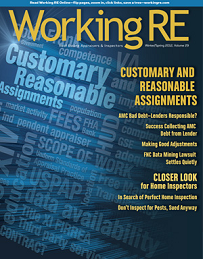|
Published by OREP, E&O Insurance Experts | June 2012 |

|
> Leave Comments Below
> RE Agent/Broker E&O Insurance
|
Many appraisers and agents have a hard time distinguishing manufactured from
modular homes- and the differences can be critical. Here's what you need to
know.
Editor’s Note: Veteran appraiser and expert Jo Anne Meyer Stratton explains the difference between manufactured and modular homes- there is more than meets the eye.
Manufactured or Modular Home?
By Jo Ann Meyer Stratton, IFA, SRA
Many appraisers and agents have a hard time distinguishing manufactured from modular homes- and the differences can be critical. Here's what you need to know.
A manufactured home is
constructed in the factory to the national HUD building code and remains a
manufactured home forever regardless of how it is installed, what type of
foundation and skirting it has or anything else that is done to
it. Classification by the local assessing/tax office or other governing agency
doesn't change a home constructed to the HUD building code either.
A manufactured home is reported on the 1004C appraisal form. Typically a
manufactured home has a metal frame/chassis/undercarriage that provides
structural support for the home after installation. There were a few constructed
in the early 1980s that did not have an undercarriage but are still manufactured
homes because they were constructed to the HUD building code.
A modular home is constructed in the factory to whatever local building code is applicable for the location it will be installed. An "off frame” chassis/undercarriage modular home does not have any metal structure to support the home. While under construction in the factory, a steel frame is used as a work table and used to transport the home from the factory to the site, where the home is picked up with a crane and put in place on a prepared foundation. The frame then goes back to the factory for construction of the next "off frame" modular.
(story continues below)

(story continues)
An “on frame” chassis/undercarriage modular home has a permanent steel undercarriage/frame/chassis that provides the structural support after the home is installed on site. Both “off frame” and “on frame” modular homes are reported on the 1004 appraisal form. If it is an “on frame” modular, it will not be eligible for a Fannie Mae loan because of some quirks in their guidelines. Fannie Mae classifies anything with a steel undercarriage as a manufactured home--which would include mobile homes constructed prior to June 15, 1976, manufactured homes constructed after that date and “on frame” modular homes. The eligibility section of their guidelines state that to be eligible for the mortgage to be purchased by Fannie Mae, the manufactured home has to be constructed to the HUD building code--which eliminates mobile homes and “on frame” modular homes. If you are appraising an “on frame” modular home, be sure and have the information in the report that it will not be eligible for Fannie Mae. It is eligible for Freddie Mac, FHA and VA. Of course, with the proposed changes at Fannie Mae and Freddie Mac, future regulations are uncertain.
The 1004C appraisal form is for manufactured homes constructed to the HUD building code only. Regardless of what type of factory built home you are appraising or inspecting (or selling), take photos and make notes of all insignias, labels, tags, data plates, etc. that you find on the exterior and in the interior of the home. Include those photos and information in the report. Appraisers research the tax situation, report what you find and if the factory built home is not currently taxed as real property, explain what needs to be done prior to close of escrow for it to be taxed in the future as real property.
Remember too that the
original building code from the factory while the home was under construction
has to be verified prior to completing the appraisal assignment. The original
building code is the only answer to whether a home is a manufactured home or a
modular home. Occasionally in some factories, manufactured homes, on frame
modular homes and off frame modular homes are all constructed in the same
factory, on the same assembly line, with the same floor plan,
materials, options, amenities. Once the construction is complete, someone
looking at the homes can not tell which home was constructed to which building
code.
While they were under construction it was constantly being inspected by a state
or private inspection agency for compliance to a specific code. When
construction is complete, the inspector will apply HUD labels on the exterior
and data plates in the interior for the ones constructed to the HUD building
code. If the home was constructed to a local site built building code like
International Residential Code, Uniform Building Code,
Building Officials and Code Administrators, or other similar codes, the state or inspection agency
tags/label indicating compliance with that code will be affixed to the home somewhere on the exterior or in the interior or on a framing member in the roofing
assembly. Those labels/tags/insignias are the only way to verify the original
building code.
ATTENTION: You are receiving WRE Online News because you opted in at WorkingRE.com or purchased E&O insurance from OREP. WRE Online News Edition provides news-oriented content twice a month. The content for WRE Special Offer Editions is provided by paid sponsors. If you no longer wish to receive these emails from Working RE, please use the link found at the bottom of this newsletter to be removed from our mailing list.




